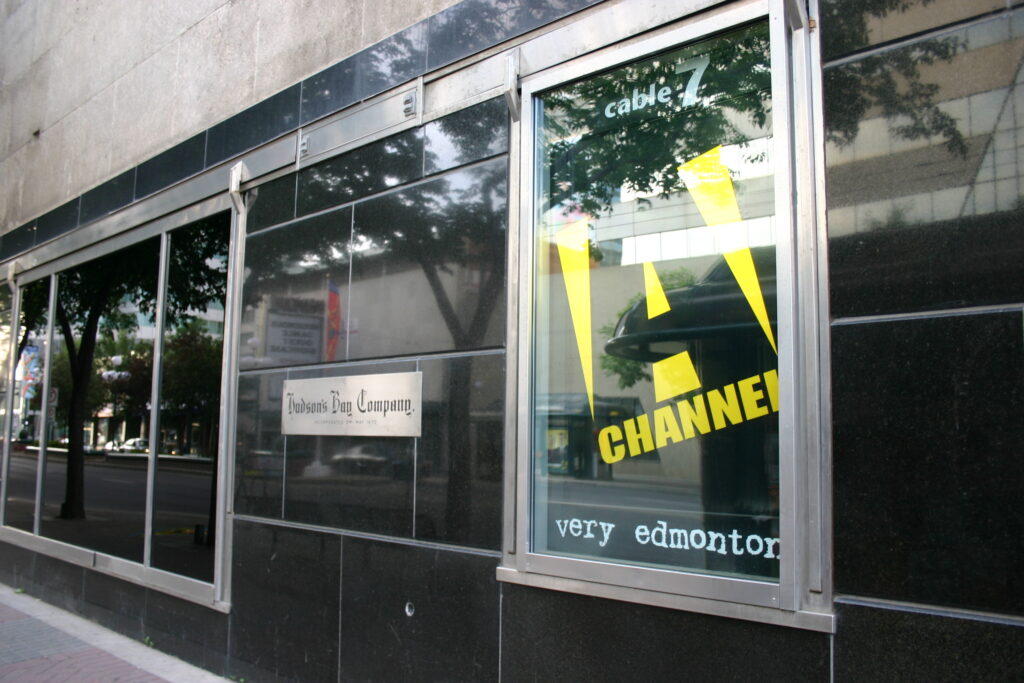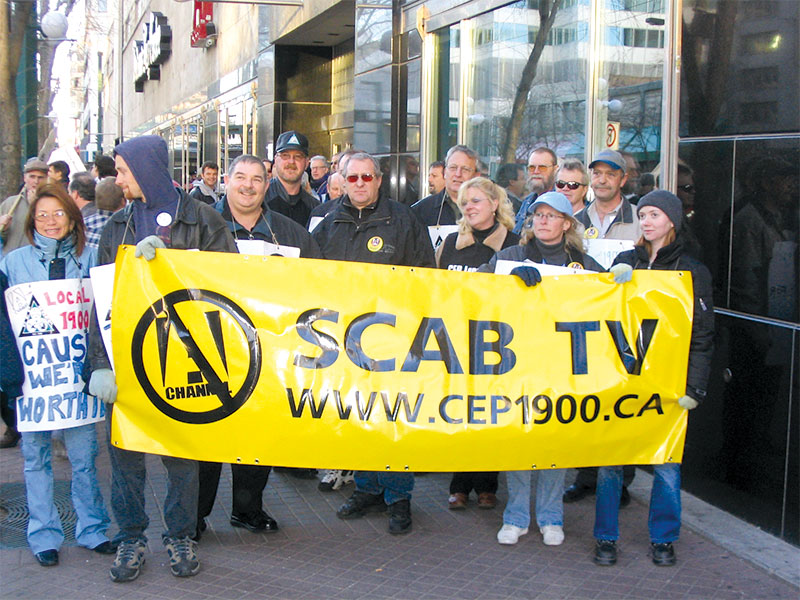2024 is the twentieth anniversary of the A-Channel Edmonton strike – a labour action that saw about 100 station workers walk off the job after more than a year of trying to negotiate a contract with the nascent TV station.[1] It was a bitter conflict that led to legal action on both sides, public and private acrimony, and ultimately hastened the station’s decline.
I experienced it all from the inside.
It’s worth noting here that while contentious labour disputes – and the threat of labour disputes – are now commonplace this was not the case in 2004. Certainly, when I started at A-Channel as a Creative Writer in September 2003 I had no idea that a work stoppage was on the horizon. I was an awkward 23-year-old kid, newly arrived in Edmonton. My first love was radio, but work was scarce in those days, so I took what I could get. My goals were to write some good TV commercials, perhaps win an award or two, and move on somewhere else.
My partner in this effort was Adrian – the commercial videographer I worked with. He was a short, mustachioed fifty-something guy with mischievous eyes and a ready smile. I liked him; he was very good at his job and made my commercials better than they otherwise would have been. Adrian was also vice-president of our union local,[2] something I didn’t pay much attention to at the time. Little did I know that Adrian was spending his days filming TV commercials, and his nights involved in contentious contract negotiations with management. [3] I had no idea how this would culminate in a strike affecting my career and life, forcing me to make one of the most difficult decisions I’ve ever had to make.
Putting the strike in context
It’s interesting to remember how different the world was 20 years ago. In 2004, television was still king. There was no social media and internet advertising was in its infancy, so if you wanted to advertise a product or service, there were a lot fewer options. A-Channel – a plucky upstart looking to lure advertisers away from CTV and Global – was one of them. I never watched the station. For me, it was a place to begin my career.
For many of my co-workers, it was a place to begin again. The previous dozen or so years were tough times for workers in the television industry, with centralization and consolidation resulting in thousands of jobs losses across Canada. [4] Western stations were hit especially hard. [5] A-Channel’s arrival in Edmonton and Calgary in 1997 was a rare bright spot in a dark decade, providing new employment opportunities to replace those lost at CTV, CBC, and what is now Global. Most of my former co-workers were at A-Channel because they had been cast-off elsewhere. This no doubt contributed to a desire to unionize and have at least some degree of control over their employment.

Storm clouds
Sometime in early fall 2003, A-Channel staff met in a downtown Edmonton hotel to discuss the company’s offer. Management, as I recall, was offering workers an 8% raise over three years. The union was seeking 12% over three years and the promise not to relocate certain positions to Calgary. [6] It didn’t seem like a big difference to me, and I was inclined to accept. Most of my coworkers were not, and urged us to vote no.
Adrian stood at the front of the room. Up until this point I had always thought him friendly and mild-mannered. Imagine my surprise, then, as he spoke with passion and intensity urging us to reject the offer and take strike action. I saw a fire in his eyes that I’d never seen before. It was inspiring, but also unnerving. For the first time I thought that a work stoppage might be possible. Soon, most staff voted to turn down the offer.

The strike (and my fateful decision)
On September 17, 2003, at 9:00am, about 80% of the station walked out the front door of the station – the old Bay building on Jasper Avenue. I was among them. We decamped to Beaver House a block away, which served as a staging ground for the strike. Edmonton police officers in plain clothes advised us of our rights and responsibilities as strikers. It was surreal and cold, as Beaver House had no heat. We took placards and walked back to begin picketing. I remember walking up and down the street in front of the station carrying a placard, silently and without much enthusiasm.
From the beginning I had a great deal of apprehension about the whole thing. I knew that the union had plans to contact clients that continued to advertise, asking them to remain neutral during the labour dispute and pull their advertising. I was not at all supportive of this. Also, the $400/week we were getting in strike pay was a big financial hit – one I could ill afford. Finally, there was a sense of camaraderie among the strikers that I felt totally left out of. I resented this and looked for a way out. After picketing for about two weeks, I called my boss and prepared to cross the line.
Station management was very happy with my return and lavished me with attention. Striking workers were less enthusiastic – they regarded me as a sellout and a traitor. I remember one striking work repeatedly yelling “scab” at me inside a grocery store. The station became a fortress as we tried to soldier on. Ratings took a huge hit [7], and advertisers abandoned us in droves. In November, Management attempted to kibosh a union-backed ad campaign, and the union sued Management for suppressing their freedom of speech. [8] In December, Management sued ten strikers for going after advertisers. [9] The strike dragged on through the fall and into the winter. I both wanted it to end and feared its conclusion, knowing that I’d have to work with these people again. After five long months, on February 14, 2004, an agreement was reached. Both sides knew the aftermath would be bumpy.[10] It was.
An uneasy peace
The overwhelming memory of have of the days following the end of the labour dispute is one of awkwardness. The relationship between Adrian and I was especially awkward – I vividly recall driving to film a commercial and sitting in complete silence the entire way. I really got the impression that he hated me. I felt guilty for letting him down. Did I make the right decision? The question has haunted me ever since. As the weeks and months went on things became a bit more bearable, but the discomfort hung in the air like a cloud. The levity that characterized the workplace was gone forever. More and more I thought about getting out and making a radical change.
Changing Channels
In April 2004, Craig Media sold their television properties to Citytv owner CHUM, and A-Channel became a memory. [11] I left the station in January 2005 to go back to school and never worked in television again. By 2007, most of my former colleagues were out of a job due to further job cuts and restructuring. Citytv, now owned by Rogers Communications, can still be found on your television dial.
[1] Cormier, Ryan “A-Channel employees air their discontent: Strike follows a year without a contract”. Edmonton Journal, September 18, 2003.
[2] Adrian Pearce served as vice-president of Communications, Energy, and Paperworkers (CEP) Union local 1900. In 2013, CEP merged with the Canadian Auto Workers Union (CAW) to form Unifor.
[3] “A-Channel television staff join largest media union” Edmonton Journal, July 5, 2002.
[4] History of Canadian Broadcasting, Canadian Broadcasting Foundation. CFRN-DT, CTV, Edmonton. https://broadcasting-history.ca/television/television-stations/alberta/cfrn-dt/ (retrieved October 10, 2024).
[5] Nash, Knowlton, The Microphone Wars: A History of Triumph and Betrayal at the CBC. McLelland & Stewart, 1994.
[6] “A-Channel Edmonton Employees on Strike”. September 18, 2003. https://www.channelcanada.com/canadian-channels/english-networks/ctv2/a-channel-edmonton-employees-on-strike/ (retrieved September 29, 2024).
[7] “A-Channel Strikes Out in Fall ratings”. Edmonton Journal, January 7, 2004.
[8] “A-Channel attempts to muzzle free speech”. Alberta Federation of Labour, November 6, 2003.
[9] Cormier, Ryan. “A-Channel slams strikers with $3M lawsuit: Local Station accused 10 pickets of harassing and intimidating advertisers”. Edmonton Journal, December 30, 2003.
[10] Gerein, Keith, “A-Channel strikers accept deal but worry about tensions at station”, Edmonton Journal, February 15, 2004
[11] Westhead, Rick, “CHUM buys Prairie empire: $265 million deal for Craig Media includes Toronto1″. The Toronto Star, April 13, 2004.
